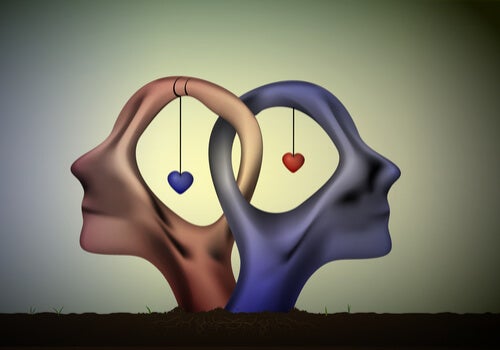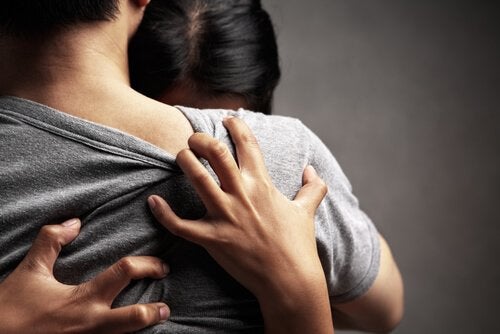Bonding with a Partner and Self-Protection


Reviewed and approved by the psychologist Sergio De Dios González
Bonding with a partner means taking a risk. It means leaving yourself open to possibly being rejected and hurt. Despite this, love is usually enough motivation to take this risk. Without realizing it, you put your trust in another person. The psychological costs of rejection, therefore, increase as a bond between a couple becomes stronger and more interdependent.
The emotional impact of being rejected can be huge. The pain is even more intense when a couple depends on one another, which is why many people protect their independence at all costs when they’re in a relationship. Even so, everyone has a basic need to establish meaningful relationships with others to fulfill a need for connection.
Bonding with a partner consists of becoming vulnerable
In any relationship, it’s normal to lay bare those aspects of yourself that you don’t like. It’s normal for there to be moments when your doubts and insecurities reveal themselves. This is why, in a healthy relationship, showing that you’re vulnerable, fragile, or far from perfect usually helps to build trust.
Opening up like this shows that you don’t want to hide behind a mask. However, this also increases the risk of having to deal with rejection.

When you place trust in a partner so that they can support you, there’s a risk that they won’t provide that support and you’ll be hurt as a consequence. This is the existential dilemma of interdependence. In order to establish healthy relationships with others, you have to leave yourself open to rejection and being hurt.
Bonding with a partner and using the “risk regulation system”
The “risk regulation system” can help manage the pain of rejection. The need to feel valued and supported by others pushes people to build stronger relationships with their partners. However, the risk of being rejected increases the need to protect yourself. This regulation system involves using three types of “contingency rules”, depending on the circumstances:
- An “appraisal” rule system. Using this system, you can analyze situations in which you need to depend on a partner. This helps you see how much they accept you and make compromises. When you have to depend on a partner, do they consider your needs or not?
- A “signaling” rule system. This system helps you understand how you feel about the support you receive from your partner or about their rejection. This is based on the good or hurtful feelings evoked by a partner’s support or rejection. In other words, the feelings of growth or of loss that affect your self-esteem.
- A “dependence regulation” rule system. Once you’ve understood this acceptance or rejection, this system shows if you’re vulnerable. As a consequence, it influences your relationship of dependence with your partner.
Dependence, dilemmas, and interpersonal relationships
It’s normal to become dependent in a romantic relationship. The actions of one person in the relationship can often limit or strengthen the abilities of the other. Conflicts of interest can be an issue and compromises and sacrifices are often necessary.
This is an example of how, every day, you put your mental welfare in the hands of your partner. These small things can lead you to use the “risk regulation system” to deal with being rejected and hurt.
These are the “mundane” things that make you think about how much a partner values you. They demonstrate if that person helps you grow or makes you feel lost. Also, they help you modify how much you emotionally depend on that person in the future.
The importance of feeling valued
Situations in which you need to depend on a partner bring into question if they’re able to respond to your needs. They highlight the threat of rejection in a romantic relationship. The bond in a relationship depends on to what extent one person can manage the perception that the other person doesn’t care for their needs.
When you feel undervalued by a partner, it doesn’t take much for you to start managing the risk of being hurt. Self-protection is the priority.
On the other hand, when you feel valued by your partner, you might not feel the same need to manage this risk. If you do feel there’s a risk, you’ll try to connect with your partner. You’ll try to find other ways of getting closer to them, instead of protecting yourself.

It works both ways
Both partners are able to manage the risk of being hurt in this way. Throughout a relationship, both can decide to protect themselves (becoming decreasingly dependent) or to try to form a stronger bond (becoming increasingly dependent).
It’s important to be able to manage risks in order to feel reasonably secure in a context where you’re constantly vulnerable. Your romantic relationships and your dependencies have a big influence on your personal qualities.
Rejection hurts, and not just because it defies the need to be included. It hurts due to its symbolic message. Rejection makes people feel that the future of their relationship with their partner or with another significant other, is uncertain. If you focus on protecting yourself, perhaps due to previous experiences, over maintaining a close relationship with your partner, all you will achieve is keeping your fears alive.
“Of all forms of caution, caution in love is perhaps the most fatal to true happiness.”
-Bertrand Russell-
Bonding with a partner consists of setting your worries aside
Studies have indicated that maintaining a relationship with a partner satisfies your needs as an adult. The curious thing is that these relationships can also cause some of the greatest anxiety, due to the possibility of being rejected.
Research conducted by social psychologist Sandra L. Murray has revealed that, in order to be truly happy, you should put any concerns about rejection to one side. According to the research, you should take risks by forming real relationships with those you can emotionally depend on. Murray’s conclusions can be found in the article “Optimizing assurance: The risk regulation system in relationships”, published by the American Psychological Association (APA).
In any case, it’s important to remember that any relationship will be more enjoyable if you prioritize bonding with a partner, rather than minimizing the risk of being rejected and hurt in the future.
Bonding with a partner means taking a risk. It means leaving yourself open to possibly being rejected and hurt. Despite this, love is usually enough motivation to take this risk. Without realizing it, you put your trust in another person. The psychological costs of rejection, therefore, increase as a bond between a couple becomes stronger and more interdependent.
The emotional impact of being rejected can be huge. The pain is even more intense when a couple depends on one another, which is why many people protect their independence at all costs when they’re in a relationship. Even so, everyone has a basic need to establish meaningful relationships with others to fulfill a need for connection.
Bonding with a partner consists of becoming vulnerable
In any relationship, it’s normal to lay bare those aspects of yourself that you don’t like. It’s normal for there to be moments when your doubts and insecurities reveal themselves. This is why, in a healthy relationship, showing that you’re vulnerable, fragile, or far from perfect usually helps to build trust.
Opening up like this shows that you don’t want to hide behind a mask. However, this also increases the risk of having to deal with rejection.

When you place trust in a partner so that they can support you, there’s a risk that they won’t provide that support and you’ll be hurt as a consequence. This is the existential dilemma of interdependence. In order to establish healthy relationships with others, you have to leave yourself open to rejection and being hurt.
Bonding with a partner and using the “risk regulation system”
The “risk regulation system” can help manage the pain of rejection. The need to feel valued and supported by others pushes people to build stronger relationships with their partners. However, the risk of being rejected increases the need to protect yourself. This regulation system involves using three types of “contingency rules”, depending on the circumstances:
- An “appraisal” rule system. Using this system, you can analyze situations in which you need to depend on a partner. This helps you see how much they accept you and make compromises. When you have to depend on a partner, do they consider your needs or not?
- A “signaling” rule system. This system helps you understand how you feel about the support you receive from your partner or about their rejection. This is based on the good or hurtful feelings evoked by a partner’s support or rejection. In other words, the feelings of growth or of loss that affect your self-esteem.
- A “dependence regulation” rule system. Once you’ve understood this acceptance or rejection, this system shows if you’re vulnerable. As a consequence, it influences your relationship of dependence with your partner.
Dependence, dilemmas, and interpersonal relationships
It’s normal to become dependent in a romantic relationship. The actions of one person in the relationship can often limit or strengthen the abilities of the other. Conflicts of interest can be an issue and compromises and sacrifices are often necessary.
This is an example of how, every day, you put your mental welfare in the hands of your partner. These small things can lead you to use the “risk regulation system” to deal with being rejected and hurt.
These are the “mundane” things that make you think about how much a partner values you. They demonstrate if that person helps you grow or makes you feel lost. Also, they help you modify how much you emotionally depend on that person in the future.
The importance of feeling valued
Situations in which you need to depend on a partner bring into question if they’re able to respond to your needs. They highlight the threat of rejection in a romantic relationship. The bond in a relationship depends on to what extent one person can manage the perception that the other person doesn’t care for their needs.
When you feel undervalued by a partner, it doesn’t take much for you to start managing the risk of being hurt. Self-protection is the priority.
On the other hand, when you feel valued by your partner, you might not feel the same need to manage this risk. If you do feel there’s a risk, you’ll try to connect with your partner. You’ll try to find other ways of getting closer to them, instead of protecting yourself.

It works both ways
Both partners are able to manage the risk of being hurt in this way. Throughout a relationship, both can decide to protect themselves (becoming decreasingly dependent) or to try to form a stronger bond (becoming increasingly dependent).
It’s important to be able to manage risks in order to feel reasonably secure in a context where you’re constantly vulnerable. Your romantic relationships and your dependencies have a big influence on your personal qualities.
Rejection hurts, and not just because it defies the need to be included. It hurts due to its symbolic message. Rejection makes people feel that the future of their relationship with their partner or with another significant other, is uncertain. If you focus on protecting yourself, perhaps due to previous experiences, over maintaining a close relationship with your partner, all you will achieve is keeping your fears alive.
“Of all forms of caution, caution in love is perhaps the most fatal to true happiness.”
-Bertrand Russell-
Bonding with a partner consists of setting your worries aside
Studies have indicated that maintaining a relationship with a partner satisfies your needs as an adult. The curious thing is that these relationships can also cause some of the greatest anxiety, due to the possibility of being rejected.
Research conducted by social psychologist Sandra L. Murray has revealed that, in order to be truly happy, you should put any concerns about rejection to one side. According to the research, you should take risks by forming real relationships with those you can emotionally depend on. Murray’s conclusions can be found in the article “Optimizing assurance: The risk regulation system in relationships”, published by the American Psychological Association (APA).
In any case, it’s important to remember that any relationship will be more enjoyable if you prioritize bonding with a partner, rather than minimizing the risk of being rejected and hurt in the future.
This text is provided for informational purposes only and does not replace consultation with a professional. If in doubt, consult your specialist.







